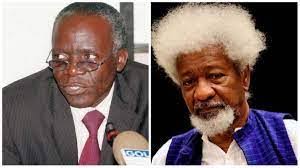The Nigerian Human Rights Community (NHRC) has sharply criticised younger Nigerians who are calling on Nobel laureate Professor Wole Soyinka and renowned lawyer Femi Falana (SAN) to lead protests against the country’s political and social issues.
The NHRC described these youths as lazy, ignorant, and misguided, accusing them of lacking historical knowledge and understanding of the sacrifices made by Soyinka and Falana in their fight for justice.
This criticism comes in response to viral mock videos accusing the two activists of staying silent since Bola Tinubu became President in 2023. The video clips have been circulating on social media, particularly among younger Nigerians, who have questioned why Soyinka and Falana are not leading protests against the current government.
In a statement released at the weekend, the NHRC warned that such attacks on these respected figures are not only unfair but also harmful to the legacy of democratic struggles in Nigeria.
“These young people are misinformed and lack any sense of history,” said Taiwo Adeleke and Digifa Werenipre, who signed the NHRC statement. “They are too focused on condemning those who have dedicated their lives to fighting for a better Nigeria instead of learning from their example.”
The group further criticised the youths for directing their frustrations at Soyinka and Falana instead of following the examples set by other younger activists like Omoyele Sowore, who, at the age of 19, began his own fight for justice and democracy. “We urge young people to emulate Sowore, who has spent over 30 years fighting for justice,” the NHRC stated.
Both Soyinka and Falana began their activism in their early twenties, participating in protests, legal battles, and social justice movements to improve the lives of Nigerians. The NHRC pointed out that these two men have spent between 45 and 65 years of their lives fighting for the freedom and rights of Nigerians, even at great personal risk.
“These young critics lack the historical awareness to understand the sacrifices Soyinka and Falana have made,” the NHRC added. “They do not know the sacrifices of those who fought for a better Nigeria, and yet they are quick to condemn.”
The group also responded directly to the accusation that Soyinka and Falana have been silent since President Tinubu took office. “This claim is completely untrue,” said the NHRC. “Soyinka and Falana have continued their activism, speaking out against government injustices and fighting for the oppressed.”
Soyinka, now 90 years old, has continued to participate in street demonstrations and public protests despite his age. Falana, too, has been actively involved in several legal battles and protests, even representing those detained during the #EndSARS protests. His son, Fola, led the protests, while Falana senior provided pro bono legal services to many detained protesters.
The NHRC stressed that it is both naive and unjust to expect these elder statesmen, who have already contributed so much to Nigeria’s progress, to continue leading protests indefinitely. “It is irresponsible to expect these two men, who have already done so much, to continue leading the charge for young people,” the group argued.
Criticising those youths who demand that Soyinka and Falana take the lead, the NHRC described them as cowardly, pointing out that many of these critics were unwilling to take to the streets themselves. “They spend their time on social media or in bars, but they are not bold enough to march on the streets,” the statement said.
The NHRC also accused these youths of working to undermine Nigeria’s heroes for personal or political gain. “It is clear that many of these critics are doing the work of the government and the ruling class,” the group stated. “Their attacks on Soyinka and Falana serve to diminish the support these heroes command from ordinary Nigerians.”
The NHRC urged the younger generation to stop attacking those who have fought for their rights and instead take action themselves. “When Soyinka and Falana were young, they did not look to the older generation to lead them,” the NHRC said. “They discovered their mission and fulfilled it. Now it is the turn of today’s youth to take up the mantle of leadership and fight for change.”
The group challenged these young critics to come forward with their own leadership and activism. “Instead of running down those who have made significant sacrifices, we challenge these young people to take the bull by the horns and provide alternative leadership,” the NHRC concluded.

